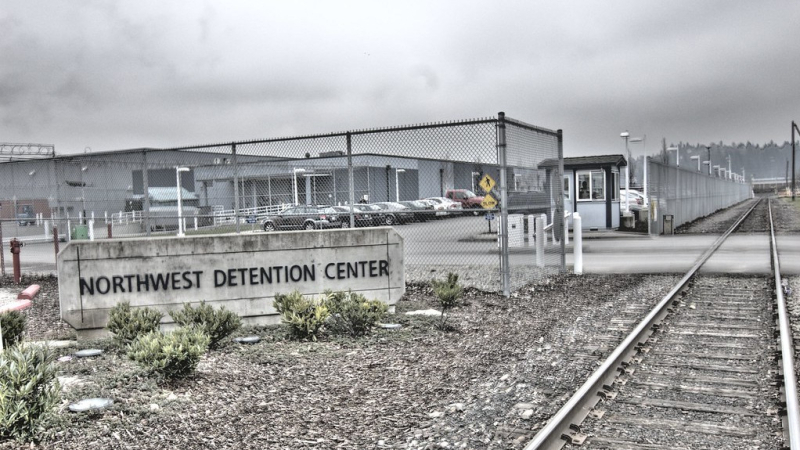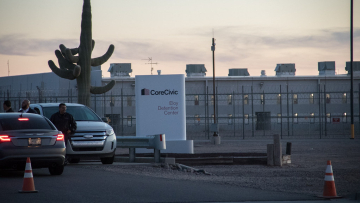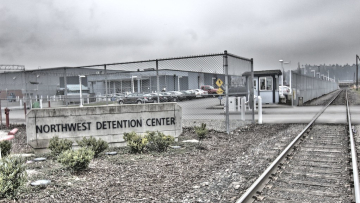Civil society groups file OECD complaint against Swiss and UK banks over private prison stock
Ryan Brightwell, Campaign Lead Banks and Human Rights, BankTrack, ryan@banktrack.org
Dana Floberg, Director of Corporate Campaigns, Worth Rises, dfloberg@worthrises.org

Ryan Brightwell, Campaign Lead Banks and Human Rights, BankTrack, ryan@banktrack.org
Dana Floberg, Director of Corporate Campaigns, Worth Rises, dfloberg@worthrises.org
Today, civil society groups BankTrack, the Coalition for Immigrant Freedom, and Worth Rises filed a complaint with the National Contact Points (NCPs) of Switzerland and the UK against Swiss-based banks UBS and Swiss National Bank and UK-based banks Barclays and HSBC. The complaint alleges that the banks’ financial involvement with private prison operators CoreCivic and GEO Group contravenes their responsibilities under the OECD Guidelines on Responsible Business Conduct.
The complaint alleges that the banks have breached the OECD principle to carry out adequate human rights due diligence with regard to their investments in CoreCivic and GEO Group, and that they have failed to seek ways to prevent or mitigate adverse human rights impacts to which they are directly linked.
Bianca Tylek, Executive Director of Worth Rises, said: “The OECD Guidelines create clear obligations for banks to ensure their investments do not contribute to human rights abuses like those regularly and conspicuously inflicted by CoreCivic and GEO Group on the people detained in their facilities. However, through both active and passive investments in both, these banks have failed to meet these obligations for far too long. It’s time that the OECD directs their compliance, forcing a divestment from CoreCivic and GEO Group.”
While public filings fail to disclose the full exposure of the banks to CoreCivic or GEO Group, they each own at least tens of thousands of shares, and in some cases hundreds of thousands of shares, sometimes spread between various subsidiaries. Some shares are held outright while others are held through index funds, primarily US small cap index funds.
Guidance documents by the United Nations Office of the High Commissioner for Human Rights and the OECD make it clear that holding shares establishes a business relationship under the OECD Guidelines. In addition, the Swiss NCP recognized the responsibility banks have for their passive investments through index funds in its initial assessment of Society for Threatened Peoples Switzerland vs. UBS Group. Despite this responsibility and the serious nature of the human rights violations associated with their investments, all four banks have failed to show how they have taken action to prevent or mitigate these violations.
Alba Lucero Villa, Executive Director at Coalition for Immigrant Freedom, said: “The human rights violations against immigrants at facilities owned or operated by private prison corporations has been widely documented and decried, yet these corporations and others like them continue to profit off their backs. According to advocates’ analysis of Securities and Exchange Commission, in 2022, GEO Group made $1.05 billion in revenue from Immigration and Customs Enforcement (ICE) contracts alone, (equaling 43.9 percent of its total revenue), while CoreCivic made $552.2 million in revenue from ICE detention contracts (accounting for 30 percent of total revenue).”
Other banks across Europe have already divested from private security contractors in recognition of clarified international standards on shareholder responsibility. If the NCPs hold to precedent and find these banks in violation of the OECD Guidelines, it would send a strong message to the remaining financial institutions that holding shares in systematic human rights violators is impermissible under OECD Guidelines. It will also further alienate CoreCivic and GEO Group, along with other private security contractors violating human rights, from international financing and investment.
Ryan Brightwell, Banks and Human Rights Lead at BankTrack, said: “Banks’ responsibilities to respect human rights apply to all aspects of their finance, including through so-called “passive investments” in index funds. Yet Barclays, HSBC, UBS and the Swiss National Bank seem to have confused “passive” with “indifferent”. We are filing this complaint because these banks have failed to show any action in the face of severe human rights violations, and we want to see action taken that can force these companies to take notice.”
Notes:
Currently about 90 percent of people in Immigration and Customs Enforcement (ICE) detention in the United States are held in facilities owned or operated by private prison corporations such as GEO Group and CoreCivic, whose contracts with ICE generate billions of dollars in revenue. There have been innumerable reports over the years of violence and abuse by United States security contractors against the people they detain or transport, including migrants seeking asylum who are subject to special protections under international law. The largest security contractors operating in the US, CoreCivic and GEO Group, often force persons detained in their facilities to perform uncompensated labor under threat of solitary confinement, physical restraint, suspension of attorney and family visitation, deprivation of necessities like food, water and hygiene products, and negative interference with ongoing asylum cases.
Though private actors have no human rights obligations under international law, the Organization for Economic Co-operation and Development (OECD) and its Guidelines for Multinational Enterprises (OECD Guidelines) impose obligations on the governments of state signatories to promote compliance among corporations operating from or within their territories. The OECD Guidelines incorporate human rights instruments such as the Universal Declaration of Human Rights, and require that all OECD member and adhering governments establish functioning National Contact Points (NCPs), government-supported offices to address cases against corporations that violate the OECD Guidelines. Complaints can be brought against companies violating human rights or against companies with business links to rights violators, such as financial institutions linked through financing or investment.
In 2019, JPMorgan Chase, Wells Fargo, Bank of America, SunTrust, BNP Paribas, Fifth Third Bank, Barclays, and PNC agreed to stop new corporate lending to CoreCivic and GEO Group under pressure from U.S. advocates, but several banks have not interpreted this commitment to extend to other business relationships, including investments.


